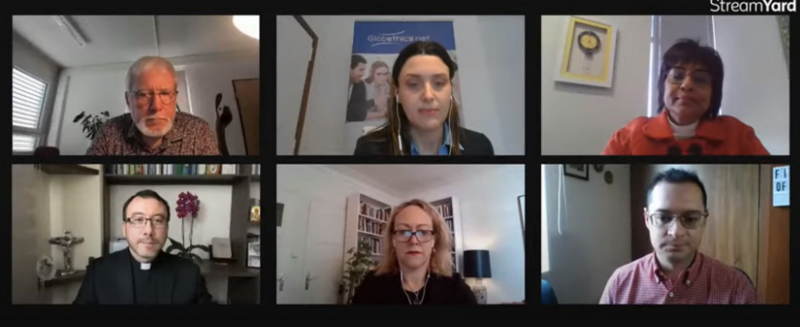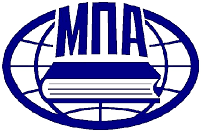
Ethics for a balanced world webinar with Uniminuto University
The event, featuring a keynote address by Globethics.net Founder and President Christoph Stückelberger, was conducted in English and Spanish and streamed through YouTube attracting an audience of over 1,500 students and faculty members in Colombia, from other countries in South America and from around the world.
As universities and higher education institutions prepare themselves and welcome students to the new academic year, the effects and disruptions of the Covid-19 pandemic remain a part of their reality alongside the social and economic inequalities and global imbalances that the pandemic has brought to the fore.
The panel of Globethics.net experts - Christoph Stückelberger, President and Founder, Divya Singh, member of the Globethics.net Board of Foundation and Chief Academic Officer at Stadio Holdings, South Africa and Christine Housel, Donor Relations and Strategic Partnerships - gave their reflections on how to respond to these disruptions and imbalances at a global level with a view to envisioning a new dynamic and balanced world order with ethics as a key element in the transition.
Globalance - a living balance
Christoph Stückelberger opened the discussion by explaining his living concept of Globalance, how the movement was his inspiration, to conceptualise it, and describe how it moves away from a static and architectonic-related Greek definition to something that is living and dynamic. Throughout his presentation, he stated the danger of extremism as it tends to only focus on one set of values diminishing the rest and how these '-ISMS' or ideologies are a barrier to achieving Globalance. He presented eleven values, including responsibility, freedom and justice, and eleven virtues with integrity, respect and courage among them, and asked the question how can the different values and virtues be balanced? His answer was that it can be done through love as the way to find holistic integration of all the ethical values. “Perfect love would be an ideal balance between these values”, he stated.
Stückelberger presented a schema to demonstrate the consequences of favouring one value, over another , i.e., empowerment vs responsibility and the importance of striking a balance between the two. For example, if an individual or institution is empowered but not charged with responsibility then they are competent but not necessarily transparent or correct in their dealings and if an individual or institutions takes on responsibility but are not empowered then they are likely to fail in the carrying out of their responsibility. A similar exercise can be conducted when opposing the values of freedom vs solidarity. He concluded by asserting the importance of sustainability as a value that exemplifies the connectivity between the relational values that he had identified. He asserted that the balance of sustainability could be achieved with all of the different values being brought into play and that it is important therefore to embrace the United Nations (UN) Sustainable Development Goals (SDG).
More about the Globalance theory and the Christoph Stückelberger book published by Globethics.net ‘Globalance: Ethics Handbook for a Balanced World Post-Covid’ can be found at https://www.globethics.net/globalance.
Higher education institutions as the wheel for societal change
As Christoph Stückelberger set the tone for the event, Divya Singh, Globethics.net Board Member, ethics expert and Globethics.net Academy course instructor, followed by sharing her wish to enrich education with ethics. She highlighted the need for a partnership between ethics, social responsibility and higher education institutions. The concepts are not new, they are well known and the key is to link them all together. She took participants through the different UNESCO reports from the last 50 years to show that they identify higher education institutions as critical vehicles for change in society.
Divya Singh asked higher education institutions to move away from being subject learning-oriented and to accept that they have a crucial role in educating students to become critical thinkers and shaping them to think beyond themselves. If higher education institutions take this challenge they have to create new links on how to better serve and adapt to the needs of society and move from an outcome-oriented to being more student and process-oriented. “It is (the concentration on) these details when the student becomes a graduate that makes the difference”, she said.
Divya Singh shared her experiences and asked the faculty members present at the webinar how often, when preparing their curricula, they related their thematic to the UN SDGs and how often did they use the words 'ethics' or 'social responsibility'. She shared with the audience the questions she asks herself when she prepares her courses:
- Does this course make the student a subject specialist?
- Does this course show the student how to apply this knowledge?
- Does this course ensure that when the students graduate, they are more socially conscious?
In her experience colleagues do not always agree that on the role of higher education goes beyond being subject-oriented. Therefore, aware that the change has to come from the top, she called upon leaders of higher education institutions to question themselves and the legacy that they would like to leave. She encourages them to build a common agenda and ensure that it is implemented along with each detail and step of the process.
Answering a question from the audience, Divya Singh mentioned a practical experience that she has had in her institution and in others of integrating ethics into the strategy. She described how they asked the students to define their values and how the students expressed them in an artistic way by placing them on a wall of fame that the students signed.
Globethics.net – a centre of excellence in ethics in higher education
The webinar concluded with a presentation by Christine Housel, responsible for Strategic Partnerships and Donor Relations at Globethics.net, on the vision, mission and resources of the organisation. Referring to Christoph Stückelberger’s address she emphasised Globethics.net commitment to the global agenda of sustainability and partnerships for achieving the United Nations Sustainable Development Goals, in particular through quality education to transform societies.










